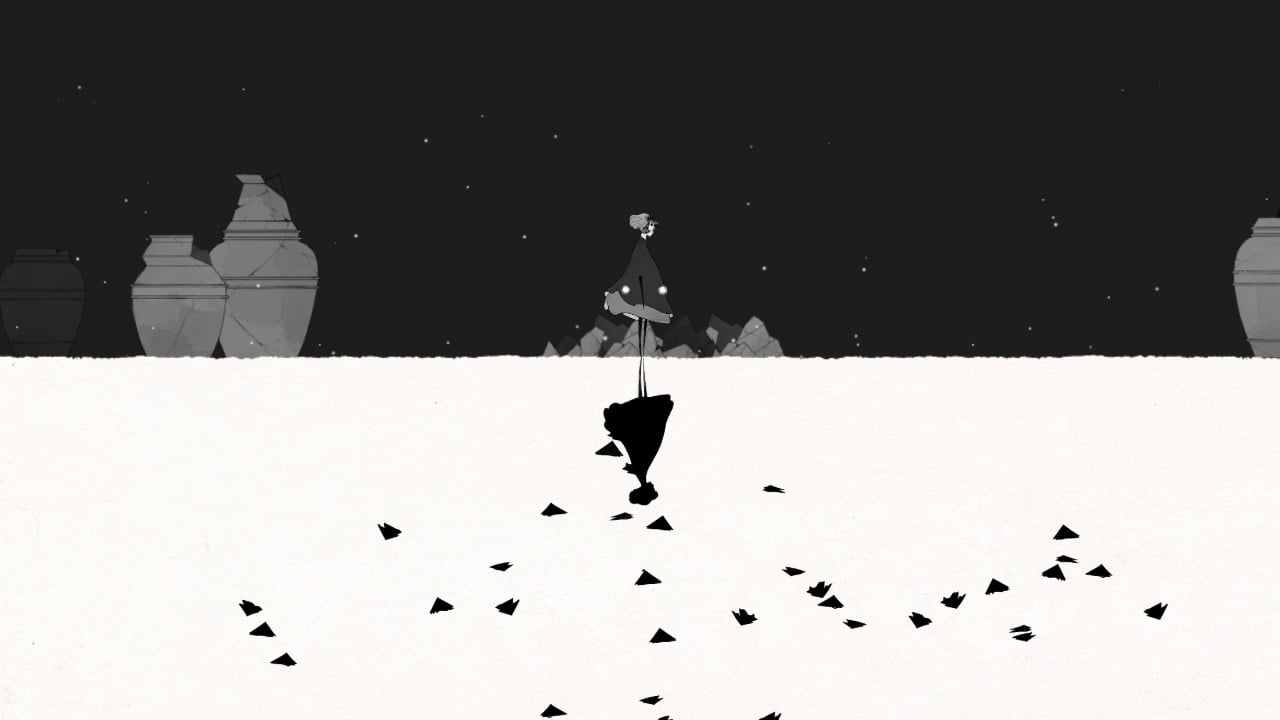It’s rare to see a creative vision produced so accurately, and with such finesse, as it is in Gris.
Gris is, on the surface, a puzzle platformer, delivered at a relaxed pace. But behind this simple exterior lies a taught focus and class of direction rarely seen in video games. Gris is Journey without the third dimension; Okami without the combat; Everybody’s Gone to the Rapture without the dialogue.
It’s a feeling, distilled and concentrated, then poured onto the game’s canvas like spilt ink onto blotting paper.
That choice is a deliberate one, a theme that runs as a current through the very centre of the game’s singular being. Gris is the video game equivalent of a mood or a colour palette, brought to life with the wash of a watercolour brush and the magic of Disney’s Fantasia.
We begin this journey with a girl, sat on the palm of a giant stone woman, singing a beautiful, choral tapestry to the statue. It feels like a personal moment, of a girl, communing with a deity. Then suddenly, she is struck dumb; her throat closes, and her beautiful, mellifluous song is lost to the world.
As all colour drains from the world of Gris, the statue crumbles, and the girl falls, for what feels like an eternity, to the desert below.




At first, she struggles, barely crawling through the sand among the ruins of crumbled stone edifices. As she trudges through the desert, through a windswept palette of grey and white, she finds her feet. Soon after, she regains the ability to jump, before learning other skills to allow her to progress through this broken, ravaged world. Fittingly, these instructions are delivered through simple on-screen button prompts, with barely a written word throughout the experience. Gris is a dream for localisation and accessibility.
The girl learns to fashion her dress into a heavy, square weight; this allows her to resist powerful gusts of wind, but also, to manipulate the world to solve puzzles. She can transform into a weight in mid-air, to break through weakened floors, or weigh down platforms and buttons. Later, she will learn to double jump and to swim, swift like a stingray. Her dress is really something.
The platforming, and indeed, the puzzle-solving is simplistic, but that suits the overall feeling of Gris. This is minimalism and precision in motion.
She collects points of light, stars fallen from the sky, to rebuild the constellations above. As she does so, the girl treads a path through the heavens, and with each bit of progress made, colour is restored to the world. Red brings with it a windswept desert; green, a lush, abstract forest; blue, a shifting world of ice and water; yellow offers us light in the dark.





While Gris is, for the most part, a slow and meditative experience, it does have its moments. There are some antagonists in the world, borne of shadow, that work to impede the girl’s progress. A screeching bird tries to prevent her passage, while a giant eel tries to eat her. In neither of these moments are you actually in danger – in fact, the eel will continue to almost eat you, even if you stop trying to evade it – but they do serve to build drama by changing the dynamic and phrasing of the experience.
It’s similar in many respects to Rime, another Spanish-developed video game with a soft, watercolour art style and a take on grief. But where Rime becomes genuinely horrific in the latter stages – you can be eaten, and killed, and all too easily – Gris manages to straddle the line between beauty and tension without harming the girl, or the player’s fragile heart.
And then, before you know it, Gris is done. Once colour is restored to the world and the girl regains her voice, our journey is over. You’ll spend just three or four hours in this world, but the pacing and length are as perfect as the presentation.
Gris is, simply put, an absorbing experience delivered with remarkable style and clarity.
Game: Gris
Platform: Nintendo Switch (reviewed), PC
Developer: Nomada Studio
Publisher: Devolver Digital
Release Date: Out Now






